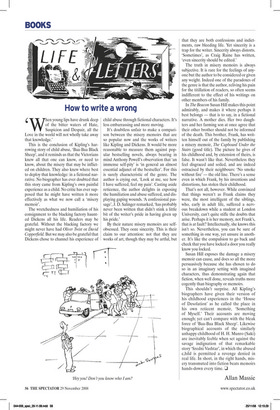How to write a wrong
‘When young lips have drunk deep of the bitter waters of Hate, Suspicion and Despair, all the Love in the world will not wholly take away that knowledge.’ This is the conclusion of Kipling’s harrowing story of child abuse, ‘Baa-Baa Black Sheep’, and it reminds us that the Victorians knew all that one can know, or need to know, about the misery that may be inflicted on children. They also knew where best to deploy that knowledge: in a fictional narrative. No biographer has ever doubted that this story came from Kipling’s own painful experience as a child. No critic has ever supposed that he might have written it more effectively as what we now call a ‘misery memoir’.
The wretchedness and humiliation of his consignment to the blacking factory haunted Dickens all his life. Readers may be grateful. Without the blacking factory we might never have had Oliver Twist or David Copperfield. But we may also be grateful that Dickens chose to channel his experience of child abuse through fictional characters. It’s less embarrassing and more moving.
It’s doubtless unfair to make a comparison between the misery memoirs that are so popular now and the works of writers like Kipling and Dickens. It would be more reasonable to measure them against popular bestselling novels, always bearing in mind Anthony Powell’s observation that ‘an immense self-pity’ is ‘in general an almost essential adjunct of the bestseller’. For this is surely characteristic of the genre. The author is crying out, ‘Look at me, see how I have suffered, feel my pain’. Casting aside reticence, the author delights in exposing the humiliation and abuse suffered, and displaying gaping wounds. ‘A confessional passage’, J. D. Salinger remarked, ‘has probably never been written that didn’t stink a little bit of the writer’s pride in having given up his pride.’ By their nature misery memoirs are selfobsessed. They ooze sincerity. This is their claim to our attention: not that they are works of art, though they may be artful, but that they are both confessions and indictments, raw bleeding life. Yet sincerity is a trap for the writer. Sincerity always distorts. ‘Sometimes’, as Craig Raine has written, ‘even sincerity should be edited.’ The truth in misery memoirs is always subjective. It is rare for the feelings of anyone but the author to be considered or given any weight. Indeed one of the paradoxes of the genre is that the author, reliving his pain for the titillation of readers, so often seems indifferent to the effect of his writings on other members of his family.
In The Beacon Susan Hill makes this point admirably, and makes it where perhaps it best belongs — that is to say, in a fictional narrative. A mother dies. Her two daughters and her farming son at once agree that their other brother should not be informed of the death. This brother, Frank, has written himself out of the family by publishing a misery memoir, The Cupboard Under the Stairs (good title). The picture he gives of his childhood and, by extension of theirs, is false. It wasn’t like that. Nevertheless they feel disgraced and soiled, and are indeed ostracised by their neighbours: ‘No smoke without fire’ — the old line. There’s a sense even in which Frank, by his inventions and distortions, has stolen their childhood.
That’s not all, however. While convinced that things weren’t as Frank claims they were, the most intelligent of the siblings, who, early in adult life, suffered a nervous breakdown while a student at London University, can’t quite stifle the doubts that arise. Perhaps it is her memory, not Frank’s, that is at fault? Intellectually, she knows this isn’t so. Nevertheless, you can be sure of something in one way, yet unsure in another. It’s like the compulsion to go back and check that you have locked a door you really know you locked.
Susan Hill exposes the damage a misery memoir can cause, and does so all the more persuasively because she has chosen to do so in an imaginary setting with imagined characters, thus demonstrating again that fiction, when well done, reveals truths more cogently than biography or memoirs.
This shouldn’t surprise. All Kipling’s biographers have given their version of his childhood experiences in the ‘House of Desolation’ as he called the place in his own reticent memoir, ‘Something of Myself.’ Their accounts are moving enough; yet can’t compare with the bleak force of ‘Baa-Baa Black Sheep’. Likewise biographical accounts of the similarly unhappy childhood of H. H. Munro (Saki) are inevitably feeble when set against the savage indignation of that remarkable story ‘Sredni Vashtar’, in which the abused c,hild is permitted a revenge denied in real life. In short, in the right hands, misery transmuted into fiction beats memoirs hands-down every time. ❑
Allan Massie


































































































 Previous page
Previous page